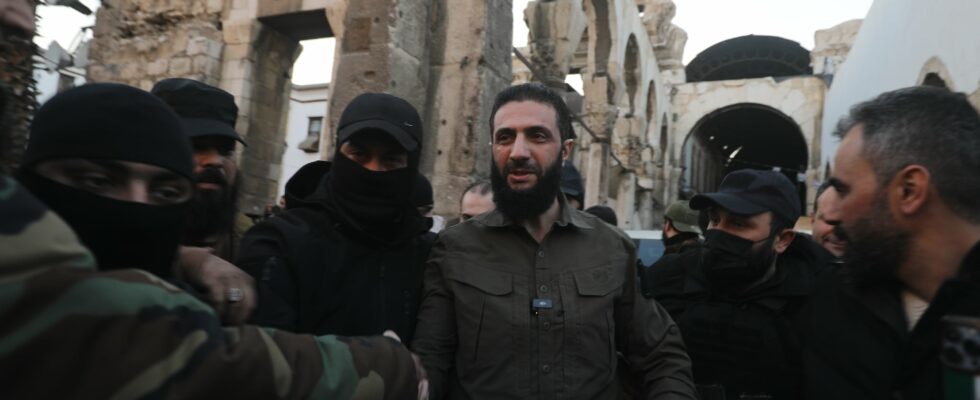His name is everywhere: television shows, analytical articles, in-depth portraits… Abou Mohammad al-Jolani, 42, succeeded in bringing down the repressive and bloodthirsty regime of the Baath Party, in power for half a century. Physically, he has little in common with the man he made flee to Moscow. Unlike Bachar-Al Assad, he is built, sports a full black beard and above all a lively look. The leader of the rebel group Hayat Tahrir al-Sham (HTC), a former branch of Al-Qaeda in Syria, aspires to become the new strongman in Syria. “He is by far the most important actor on the ground,” says Jérôme Drevon, senior jihad analyst at the International Crisis Group, in the New York Times.
To achieve his goals, this former member of Al-Qaeda knows what he has to do: smooth the image of his rebel squadrons, still considered terrorist organizations by the West. With moderate speeches coupled with the promise of a “peaceful” transfer of power in Syria, Abou Mohammad al-Jolani is trying to make people forget a heavy CV in the jihadist world. If he has put aside turbans and religious tunics to seduce the international community, who is this man who already seems to have had a thousand lives?
First difficulty: his place of birth is controversial. The Arab media oscillate between Deraa, in southern Syria, Damascus, and even Riyadh, in Saudi Arabia. The year of his birth, 1982, however, is the subject of consensus. His parents would be Syrian exiles, if we rely on the portrait painted by the English-speaking media The New Arab. For our colleagues, the young Ahmed al-Chareh, his real name, was born in Saudi Arabia before returning with his family to Syria at the end of the 1980s.
He grew up in Mazé, a wealthy neighborhood in Damascus. “From a very young age, Jolani developed the feeling of being different from others… His disciplined childhood gradually gave way to a rebellious personality,” reports the specialized site Middle East Eye.
Jihadist training with Al-Qaeda
Like his father, Ahmed al-Chareh was interested in politics and was upset by the second Palestinian intifada – a period of Israeli-Palestinian violence from September 2000 – when he was only 18 years old. A year later, the young Syrian cannot help but feel a “feeling of happiness” when he sees, on his television set, the towers of the World Trade Center collapsing on September 11, 2001. Little by little, the one who wanted to become a doctor slides towards jihadism: he attends sermons and secret round tables, far from his wealthy suburbs.
The American invasion of Iraq in 2003 pushed him to leave for Badgad, to join the ranks of Al-Qaeda led by Abu Musab al-Zarqawi, an extremist specializing in suicide attacks against Americans but also against Iraqi Shiites. He became a true jihadist and took the name Abu Mohammad al-Jolani, in homage to his grandfather who was displaced from the Golan after the 1967 conquest by Israel. At least, that’s what he claims. His enlistment in Al-Qaeda will earn him five years in an American prison in Iraq, according to American officials. It would be at this moment that he matured his plan to return to his country of origin.
At the start of the Syrian revolt in 2011, Abu Mohammad al-Jolani returned to Syria to found a branch of Al-Qaeda, the Al-Nusra Front, which would become HTC. His charisma attracts young recruits. In 2013, he refused to be knighted by Abu Bakr al Baghdadi, future leader of IS, and preferred the emir of al-Qaeda, Ayman al-Zawahiri. “In 2014, he was at the height of his radicalism to assert himself against the radical fringe of the rebellion and the (jihadist) organization Islamic State, to then moderate his remarks,” underlines Thomas Pierret to AFP, a specialist in Islamism in Syria.
Operation seduction towards Westerners
Abu Mohammad al-Jolani understands that if he wants to destroy the regime of Bashar Al-Assad, he must become friendly. Especially if he wants to ask for help from the Turkish neighbor, ready to turn a blind eye to his past if this leaves him free rein to persecute the Kurdish people in Syria. In 2016, he therefore broke with Al-Qaeda and began to present himself as a defender of pluralism and tolerance. Enough to make his opponents smile, who describe him as an opportunist. Unlike the Islamic State group, Abu Mohammad al-Jolani does not seek to directly confront the West, wishing, on the contrary, to acquire international legitimacy.
In 2017, he imposed on radical rebels in northern Syria a merger with HTC and began to develop an autonomous zone in the governorate of Idlib (northwest of the country). It sets up a civil administration, collecting taxes, providing limited public services and even issuing identity cards to residents, according to a United Nations report. Furthermore, he multiplies his gestures towards the Christian minority. However, Hayat Tahrir al-Sham remains in favor of a government guided by a conservative Sunni Islamist ideology. In Idlib, HTC has also been accused by residents, relatives of detainees and human rights defenders of abuses which, according to the UN, amount to war crimes, provoking demonstrations a few months ago.
The concept of democracy or the aspect of human rights is not at the top of its priorities. Criticized for his authoritarian tactics, the forty-year-old rushed, Wednesday, December 4, to reassure the inhabitants of Aleppo, a city which has a large Christian community. To the “heroic mujahideen on the ground”, he asks to “treat with respect” the Aleppines “of all faiths”. Through this speech, the leader of HTC seeks to present himself “as the protector of minorities”, explains a Syrian journalist to the Lebanese site Al-Modontaken up by Courrier International. Note that this role had long been attributed to Bashar Al-Assad. With the consequences that we know.
